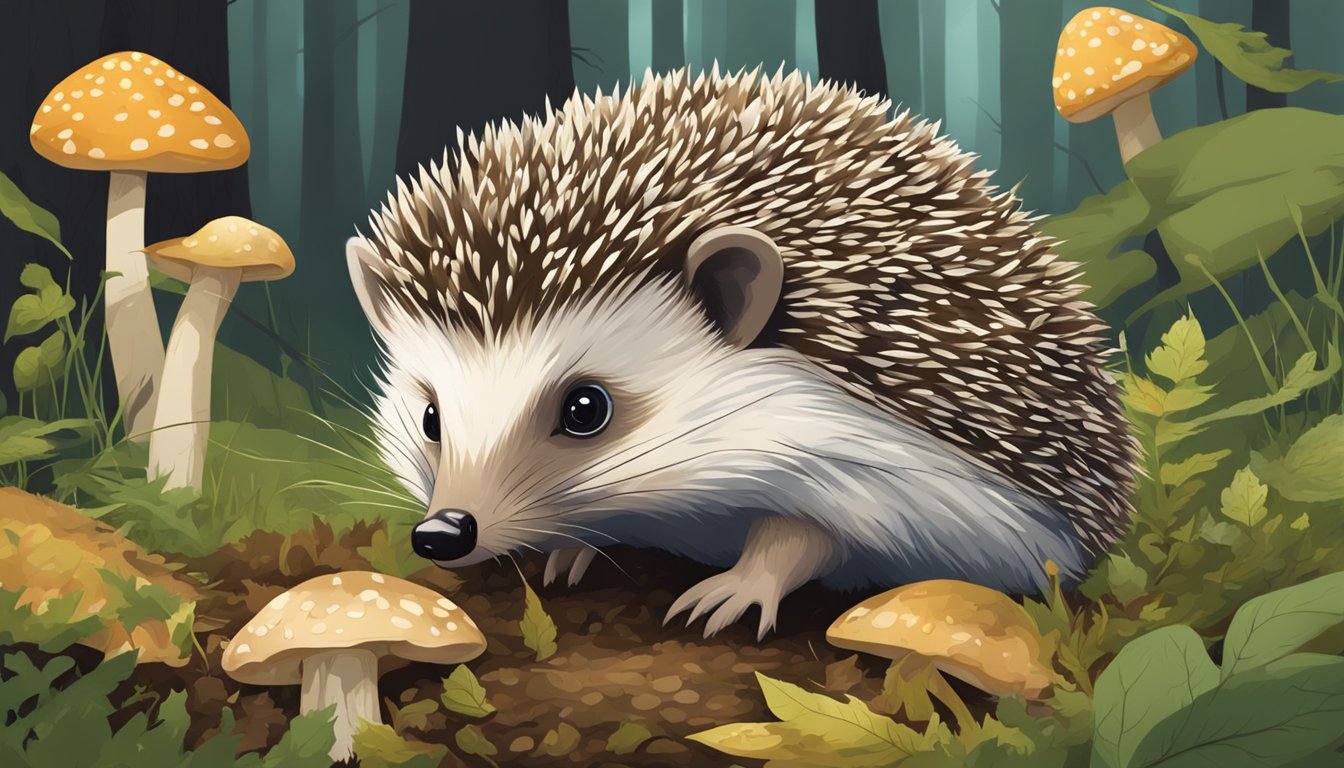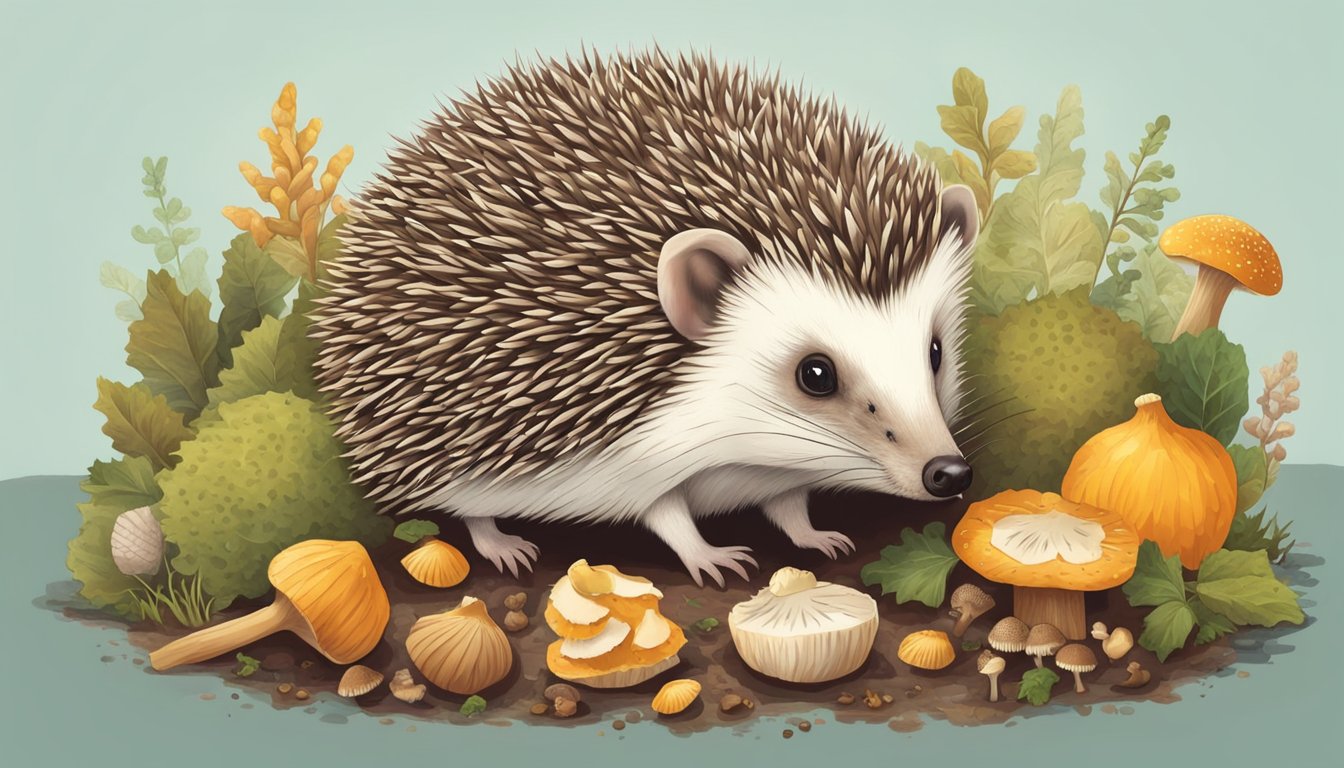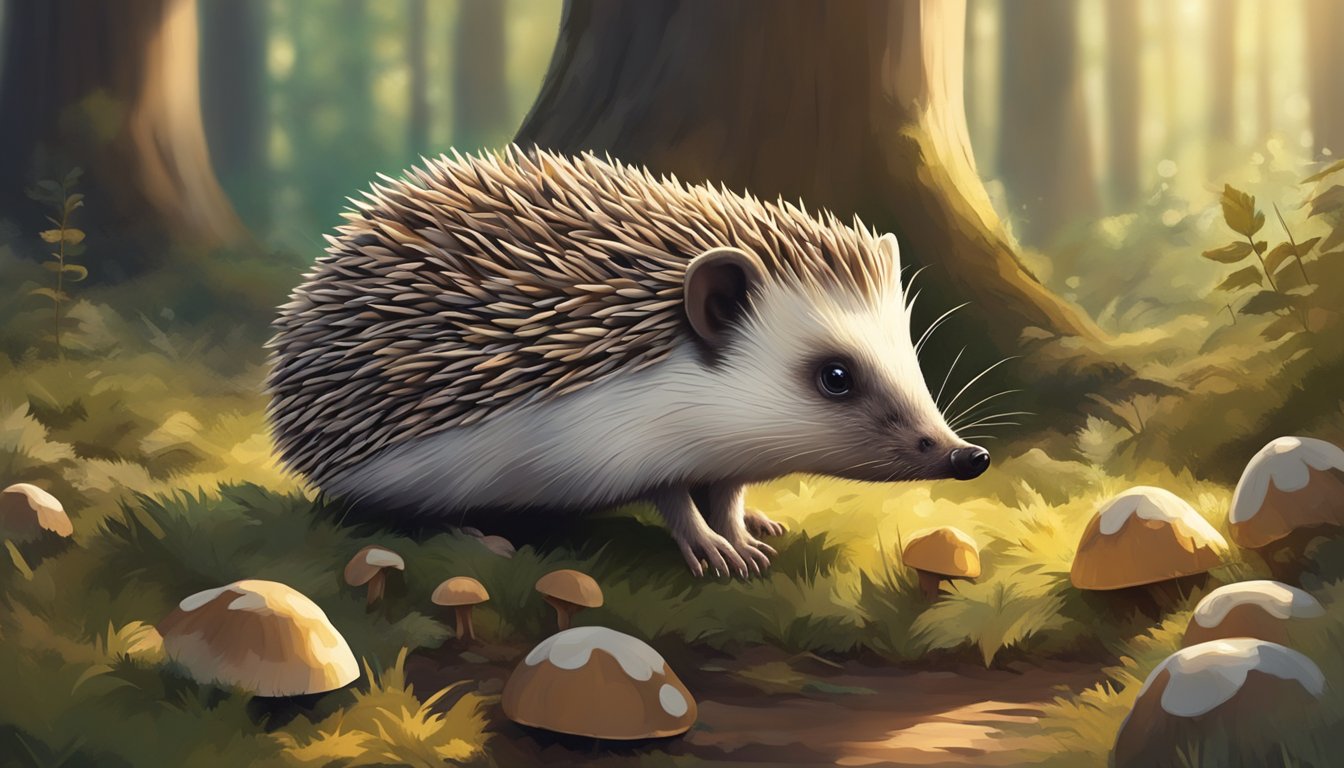Hedgehogs are small, spiny mammals known for their diverse dietary preferences. They are often considered insectivores due to their fondness for insects, but recent understanding classifies them as omnivores.
This broader classification is due to their dietary habits that include a variety of other foods, such as fruits, vegetables, and, in some cases, even mushrooms. The dietary flexibility of hedgehogs allows them to adapt to different environments and food sources, essential for their survival in the wild.

Mushrooms are known to be a part of the natural diet of hedgehogs, and many owners consider adding them to their pet hedgehogs‘ diets. Before doing so, it is crucial to ensure the mushrooms are safe for hedgehog consumption, as some varieties could be toxic.
When introduced in moderation, mushrooms can offer additional nutrients to a hedgehog’s diet. Still, they should not replace the essential components such as insects and specially formulated hedgehog food that meet their primary nutritional needs.
Key Takeaways
- Hedgehogs are omnivores and can enjoy a varied diet, including insects, fruits, vegetables, and sometimes mushrooms.
- It’s essential to verify the safety of mushrooms for hedgehogs, as some can be toxic.
- A balanced diet for hedgehogs should primarily consist of insects and specific hedgehog foods, with treats like mushrooms given in moderation.
Understanding Hedgehogs’ Dietary Needs

When considering a hedgehog’s diet, it’s essential to understand its nutritional requirements and limitations to maintain its health.
Natural Diet and Nutrition
Hedgehogs are primarily insectivores, meaning their diet consists mainly of insects in the wild. These insects provide essential nutrients such as protein, fiber, and fat for survival.
However, they are also known to be omnivores to some extent, occasionally consuming plant matter and small animals. A diet that closely mimics their natural intake is ideal for pet hedgehogs.
They require a balanced diet that includes:
- Insects: Such as mealworms, crickets, and other small invertebrates
- Lean Meats: Cooked and without added seasoning
- Fruits and Vegetables: In small amounts due to sugar content
- Prepared Hedgehog Foods: Formulated to meet nutritional standards
It’s important to ensure they get enough hydration and a variety of vitamins and minerals to support their digestive system and overall health.
Hedgehog Dietary Restrictions
A hedgehog’s digestive system cannot handle certain foods, and some can be harmful. To prevent issues such as obesity and nutritional imbalances, certain restrictions must be observed:
- High-Fat Foods: Can lead to obesity
- Milk and Dairy Products: Hedgehogs are lactose intolerant
- Wild-caught Insects: May contain parasites or pesticides
- Raw Meats or Eggs: Pose a risk of salmonella
- Processed Human Foods: Often too high in salt, sugar, and seasonings
Providing a healthy diet is vital to keeping a hedgehog active and thriving. One must avoid foods that disrupt their nutrient intake or cause obesity. Remember, moderation and variety are the cornerstones of a hedgehog’s diet.
Can Hedgehogs Eat Mushrooms?

When considering mushrooms as a food for hedgehogs, it’s important to distinguish between safe, edible options and those that could be toxic. Some mushrooms can be nutritious, while others must be avoided to prevent health issues.
Edible Mushrooms for Hedgehogs
Hedgehogs can eat certain mushrooms that offer nutritional value as part of a balanced diet. Feeding mushrooms should be fresh and thoroughly cleaned to remove pesticides or contaminants.
Sticking to mushrooms that are deemed safe for human consumption is essential, as these are also typically suitable for hedgehogs. These fungi can provide hedgehogs with vitamins and minerals beneficial to their health.
However, like many treats, they should be given in moderation due to their sugar content.
Suitable edible mushrooms for hedgehogs may include:
- Plain cooked white button mushrooms
- Sliced cremini mushrooms
- Cooked portobello mushroom pieces
It’s worth noting that mushrooms should never replace the primary components of a hedgehog’s diet, which consists of high-quality food, meat-based proteins, and various fruits and vegetables.
Toxic Mushrooms and Hedgehogs
Many wild mushrooms possess compounds that can harm hedgehogs, causing adverse reactions or even death. Therefore, hedgehog owners must be cautious and avoid feeding wild mushrooms or fungi of uncertain edible status.
Mushrooms known to be toxic to humans are also dangerous for hedgehogs and should never be included in their diet. If a hedgehog accidentally consumes a toxic mushroom, immediate veterinary care is needed to address potential poisoning.
Examples of mushrooms and fungi deemed unsafe for hedgehogs include:
- Fly agaric (Amanita muscaria)
- Death cap (Amanita phalloides)
- False morels (Gyromitra spp.)
When doubting a mushroom’s safety, err on caution and not feed it to your hedgehog. Always consult with a veterinarian or a hedgehog-savvy pet nutritionist if you are unsure about the suitability of certain food items for your pet.
Feeding Your Pet Hedgehog
Regarding nourishing their spiny companions, hedgehog owners must prioritize a balanced diet that meets all their nutritional needs, featuring a mix of proteins and fresh produce, while being mindful of unsafe foods for their pets.
Creating a Hedgehog Diet Plan
A hedgehog’s diet should be protein-rich, typically sourced from insects and commercial hedgehog food. They can eat a variety of live or dried insects, such as beetles, caterpillars, and earthworms.
For those hedgehog owners who prefer a convenient option, commercially prepared hedgehog food often contains the necessary mixture of proteins, fats, carbohydrates, vitamins, and minerals.
- Insects to Include: Beetles, caterpillars, grasshoppers, and earwigs.
- Commercial Food: Should be explicitly formulated for hedgehogs.
In addition to these primary food sources, hedgehogs can enjoy a selection of fruits and vegetables. However, as they can be picky eaters and prone to obesity, these should be given in moderation.
- Fruits: Apples, pears, bananas (in small quantities).
- Vegetables: Asparagus, cucumber, broccoli, carrots, lettuce.
Safe Treats and Foods to Avoid
Besides their regular diet, hedgehogs can occasionally indulge in certain treats. Safe options include unseasoned cooked meats like chicken or beef, and some owners have reported success with small pieces of watermelon and carrots.
Meanwhile, mushrooms are safe and potentially beneficial to hedgehogs when properly incorporated into their diet.
Here is a quick reference for hedgehog treats:
- Safe Treats: Cooked chicken, cooked lean beef, watermelon, carrots.
- Mushrooms: Safe in moderation, but should be fresh and clean.
Hedgehog owners must be aware of the foods to avoid. Certain foods may be harmful and should never be included in a hedgehog’s diet.
- Foods to Avoid: Avocado, onion, grapes, raisins, chocolate, or anything high in fat, salt, or sugar.
Creating a well-rounded diet plan for a hedgehog involves a delicate balance. Owners can ensure their hedgehog receives proper nutrition by focusing on appropriate insects, high-quality commercial food, and the occasional safe treat. Similarly, knowledge about unsafe foods protects the hedgehog from potential health issues.




Leave a Reply